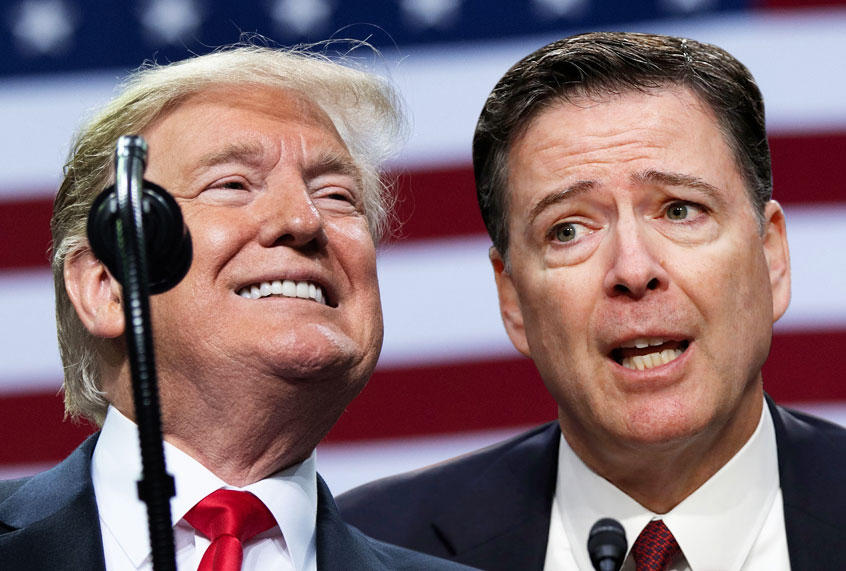Politics
Trump Indicts Comey: Echoes of Authoritarianism Resurface

The recent indictment of former FBI Director James Comey by the U.S. Department of Justice marks a significant moment in America’s political landscape. On September 25, 2023, charges were brought against Comey, with allegations of false testimony linked to the investigation of Russian interference in the 2016 presidential election. This event has reignited discussions about the state of democracy in the United States and the implications of such actions under former President Donald Trump’s influence.
Reflecting on the trajectory of American democracy since Trump’s election in 2016, many observers are raising alarm bells about a potential slide toward authoritarianism. Trump’s administration has been characterized by actions that challenge the traditional norms of governance, with critics arguing that this indictment represents a dangerous precedent. It appears that the former president views this legal action not merely as a judicial process but as part of a broader campaign against perceived enemies.
In an incisive commentary, Lawrence Douglas of the Guardian highlighted the troubling nature of Comey’s indictment, stating, “Comey is being persecuted, not prosecuted, for putting service to the nation above obedience to a man.” This sentiment encapsulates a growing concern among legal experts and historians regarding the implications of such politically charged prosecutions.
Historical Parallels and Current Threats
Historian Adam Hochschild, known for his work on democracy’s fragility, emphasized the historical parallels between current events and the tumultuous periods of the past. In a recent interview, he noted, “This is profoundly frightening because it’s right out of the playbook of the way democracies are converted to dictatorships.” Hochschild drew comparisons to the aftermath of World War I and the Russian Revolution, when paranoia led to the suppression of dissent and a clampdown on civil liberties.
He recalled that during the early 20th century, the U.S. government took extreme measures, including the shutdown of numerous newspapers and the imprisonment of critics like Socialist leader Eugene V. Debs. Hochschild warned that Trump’s current actions, including his attacks on the media and his attempts to exert control over electoral processes, represent a significant escalation. “He is going one step further than this country went during the madness of the Red Scare of 1917-1921 by trying to seize control of electoral machinery,” Hochschild remarked.
The implications of the Comey indictment extend beyond his individual case. It raises questions about who might be next, as investigations have already targeted notable figures such as former National Security Adviser John Bolton and Democratic leaders like Adam Schiff and Letitia James. The landscape suggests a pattern of retribution that could undermine the democratic process and instill fear among those who might speak out against the former president.
Legal and Institutional Challenges
The role of the judiciary in this context cannot be understated. Critics argue that the current Supreme Court, led by Chief Justice John Roberts, has contributed to an environment where Trump feels emboldened to act outside the boundaries of the law. Legal scholar Lisa Graves pointed out that the Supreme Court’s decisions have essentially granted Trump “a license to weaponize the executive branch.” This has resulted in a significant erosion of checks and balances designed to protect democracy.
As the indictment unfolds, it is evident that the political climate is shifting rapidly. Many observers believe that the normalization of such prosecutions could lead to even more severe actions against political opponents. The phrase “malignant normality” has emerged as a descriptor for the current state of affairs, reflecting how extraordinary measures have become commonplace.
The broader implications for American democracy are daunting. The erosion of trust in institutions and the increasing polarization of political discourse signal a precarious future. As the nation grapples with these challenges, the urgency for public engagement and resilience has never been more critical.
In conclusion, the indictment of James Comey is not just a legal matter; it is a pivotal moment that raises fundamental questions about the health of American democracy. As history continues to unfold, the choices made by citizens and leaders alike will determine whether the nation can navigate this tumultuous period without further sacrificing its democratic ideals. The road ahead demands vigilance, critical engagement, and a commitment to preserving the principles that underpin a functioning democracy.
-

 Lifestyle3 months ago
Lifestyle3 months agoLibraries Challenge Rising E-Book Costs Amid Growing Demand
-

 Sports3 months ago
Sports3 months agoTyreek Hill Responds to Tua Tagovailoa’s Comments on Team Dynamics
-

 Sports3 months ago
Sports3 months agoLiverpool Secures Agreement to Sign Young Striker Will Wright
-

 Lifestyle3 months ago
Lifestyle3 months agoSave Your Split Tomatoes: Expert Tips for Gardeners
-

 Lifestyle3 months ago
Lifestyle3 months agoPrincess Beatrice’s Daughter Athena Joins Siblings at London Parade
-

 World2 months ago
World2 months agoWinter Storms Lash New South Wales with Snow, Flood Risks
-

 Science3 months ago
Science3 months agoTrump Administration Moves to Repeal Key Climate Regulation
-

 Business3 months ago
Business3 months agoSoFi Technologies Shares Slip 2% Following Insider Stock Sale
-

 Science3 months ago
Science3 months agoNew Tool Reveals Link Between Horse Coat Condition and Parasites
-

 Science2 months ago
Science2 months agoSan Francisco Hosts Unique Contest to Identify “Performative Males”
-

 Sports3 months ago
Sports3 months agoElon Musk Sculpture Travels From Utah to Yosemite National Park
-

 Science3 months ago
Science3 months agoNew Study Confirms Humans Transported Stonehenge Bluestones








